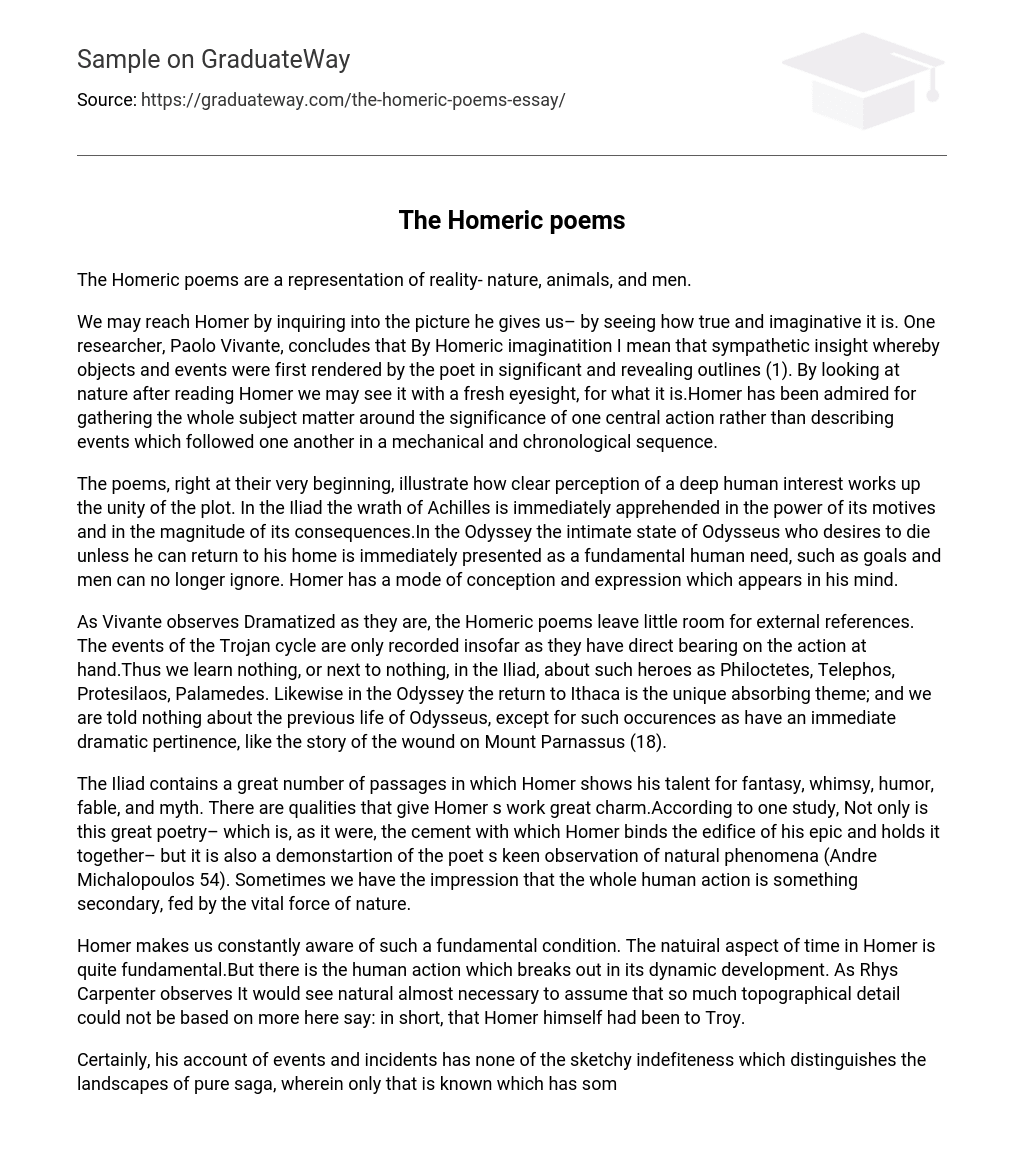The Homeric poems are a representation of reality- nature, animals, and men.
We may reach Homer by inquiring into the picture he gives us– by seeing how true and imaginative it is. One researcher, Paolo Vivante, concludes that By Homeric imaginatition I mean that sympathetic insight whereby objects and events were first rendered by the poet in significant and revealing outlines (1). By looking at nature after reading Homer we may see it with a fresh eyesight, for what it is.Homer has been admired for gathering the whole subject matter around the significance of one central action rather than describing events which followed one another in a mechanical and chronological sequence.
The poems, right at their very beginning, illustrate how clear perception of a deep human interest works up the unity of the plot. In the Iliad the wrath of Achilles is immediately apprehended in the power of its motives and in the magnitude of its consequences.In the Odyssey the intimate state of Odysseus who desires to die unless he can return to his home is immediately presented as a fundamental human need, such as goals and men can no longer ignore. Homer has a mode of conception and expression which appears in his mind.
As Vivante observes Dramatized as they are, the Homeric poems leave little room for external references. The events of the Trojan cycle are only recorded insofar as they have direct bearing on the action at hand.Thus we learn nothing, or next to nothing, in the Iliad, about such heroes as Philoctetes, Telephos, Protesilaos, Palamedes. Likewise in the Odyssey the return to Ithaca is the unique absorbing theme; and we are told nothing about the previous life of Odysseus, except for such occurences as have an immediate dramatic pertinence, like the story of the wound on Mount Parnassus (18).
The Iliad contains a great number of passages in which Homer shows his talent for fantasy, whimsy, humor, fable, and myth. There are qualities that give Homer s work great charm.According to one study, Not only is this great poetry– which is, as it were, the cement with which Homer binds the edifice of his epic and holds it together– but it is also a demonstartion of the poet s keen observation of natural phenomena (Andre Michalopoulos 54). Sometimes we have the impression that the whole human action is something secondary, fed by the vital force of nature.
Homer makes us constantly aware of such a fundamental condition. The natuiral aspect of time in Homer is quite fundamental.But there is the human action which breaks out in its dynamic development. As Rhys Carpenter observes It would see natural almost necessary to assume that so much topographical detail could not be based on more here say: in short, that Homer himself had been to Troy.
Certainly, his account of events and incidents has none of the sketchy indefiteness which distinguishes the landscapes of pure saga, wherein only that is known which has somehow failed to slip through the meshes of the great sieve of word-tomouth repition (36).Homer worked with traditional material as well as with convetional poetic methods, and he tends to combine his own epoch with that of the Trojan War. There is still controversy over one person being responsible for two epics. The Iliad and Odyssey both deal with legendary events that were believed to have occurred many centuries before they were written.
Both epics are written in formal verse. The meter used is called dactylic hexameter. There is no real distinction made between the two works. The Iliad deals with passions, with insoluble dilemmas.
On the other hand, in the Odyssey, the wicked are destroyed, right prevails, and the family is reunited with normal thinking, particularly Odysseus, who acts as the guiding force throughout the story. Those are the reasons many people believe that the two epics were written by different hands. The dramatic date of both the Iliad and Odyssey is the late Bronze Age, so called because the primary metal for use in tools and weapons was bronze. Little information is known about Homer the individual.
We do know that he was blind and came from the island of Chios.The poems as we know them now came into being in the sixth century B. C. in Athens.
The Iliad and Odyssey are epic poems about the Heroic Age that were orally composed. It is very apparent that Homer was the parent of all succeeding Greek literature. Homer s work was a target and also a model. Since Homer s time, there has not been a serious author as Homer was.
Homer was a man of great skill and talent. He was able to incorporate the use of reality with that of man and animal. Homer could take legendary events and mold them into his own style of writting. Homer will never be forgotten as a great author of western liteature.





